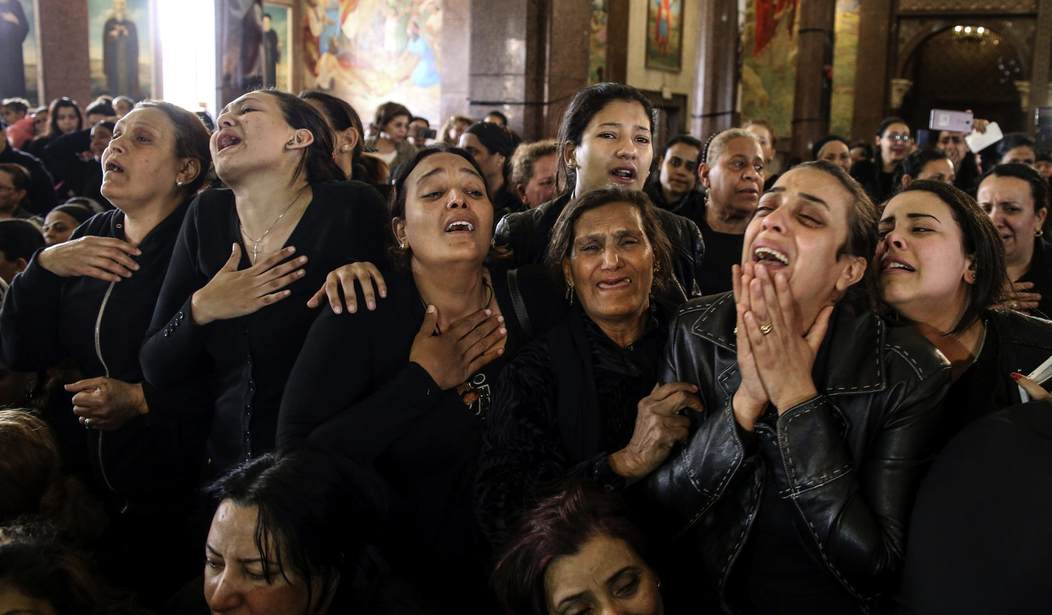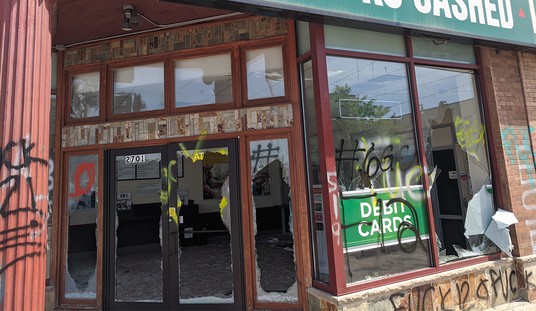The lengths to which the left is willing to dissemble to protect its narratives in the face of jihadist savagery were on full display in the New York Times’ coverage of the Islamic State’s Palm Sunday church bombings in Egypt.
Primary among these narratives is the idea that Islam has nothing to do with jihadism, even when carried out by the jihadists of the Islamic State (IS) who explicitly target nonbelievers and indeed base all their actions on Islamic doctrine.
The Times gives the following context for the IS bombings that left almost 50 dead:
Routed from its stronghold on the coast of Libya, besieged in Iraq and wilting under intense pressure in Syria, the militant extremist group urgently needs to find a new battleground where it can start to proclaim victory again. The devastating suicide attacks on Sunday in the heart of the Middle East’s largest Christian community suggested it has found a solution: the cities of mainland Egypt.
Since December, the Islamic State, also known as ISIS, has signaled its intent to wage a sectarian war in Egypt by slaughtering Christians in their homes, businesses and places of worship. Several factors lie behind the vicious campaign, experts say: a desire to weaken Egypt’s authoritarian leader, Abdel Fattah el-Sisi; a need to gain a foothold in Egypt beyond the remote Sinai deserts where jihadists have been battling the army for years; and a desire to foment a vicious sectarian conflict that would tear at Egypt’s delicate social fabric and destabilize the state.
“The Gray Lady” thus casts the Islamic State’s actions in purely political terms: With IS supposedly on the ropes, it must show it can project power and expand its sphere of influence by taking on Egyptian President Abdel Fattah el-Sisi.
This interpretation fails to address the reality that the church bombings were aimed squarely at Egypt’s Coptic Christians, including Pope Tawadros II, who was attending services at one of the churches bombed — a fact not revealed until several paragraphs into the article.
One might think that an Islamic State attack on the leader of the Coptic church on Palm Sunday would draw more emphasis than a narrative about IS’ struggles, or later in the piece General Sisi’s crackdown on civil society in response to the attack.
Why is the ignored religious component so critical?
Islamic supremacists are persecuting Christians in the Middle East and throughout the world.
IS in particular has been engaged in a genocide against Christians and other religious minorities throughout the region, as Congress recognized in a unanimous 393-0 vote in March 2016, and even jihadist coddling then-Secretary of State John Kerry acknowledged.
IS bases these attacks on Islamic doctrine, including the imperative to kill nonbelievers who refuse to submit to Islamic rule.
IS provides the rationale for its war on Christians and others in the 15th issue of IS’ official publication, Dabiq, titled “Breaking the Cross.” It reads in part:
We hate you, first and foremost, because you are disbelievers; you reject the oneness of Allah – whether you realize it or not – by making partners for Him in worship, you blaspheme against Him, claiming that He has a son, you fabricate lies against His prophets and messengers, and you indulge in all manner of devilish practices. It is for this reason that we were commanded to openly declare our hatred for you and our enmity towards you. “There has already been for you an excellent example in Abraham and those with him, when they said to their people, ‘Indeed, we are disassociated from you and from whatever you worship other than Allah. We have rejected you, and there has arisen, between us and you, enmity and hatred forever until you believe in Allah alone’” (Al-Mumtahanah 4). Furthermore, just as your disbelief is the primary reason we hate you, your disbelief is the primary reason we fight you, as we have been commanded to fight the disbelievers until they submit to the authority of Islam, either by becoming Muslims, or by paying jizyah – for those afforded this option – and living in humiliation under the rule of the Muslims. Thus, even if you were to stop fighting us, your best-case scenario in a state of war would be that we would suspend our attacks against you – if we deemed it necessary – in order to focus on the closer and more immediate threats, before eventually resuming our campaigns against you. Apart from the option of a temporary truce, this is the only likely scenario that would bring you fleeting respite from our attacks. So in the end, you cannot bring an indefinite halt to our war against you. At most, you could only delay it temporarily. “And fight them until there is no fitnah [paganism] and [until] the religion, all of it, is for Allah” (Al-Baqarah 193). [Emphasis mine]
To neglect this context is to obscure the true nature of the attacks in Egypt.
But the Times’ sins of omission are not to be outdone by its sins of commission.
For while the Times de-emphasizes the targeting of Coptic Christians based on their religion by IS, it outright lies about the history of persecution to which these very Christians have been subjected by other Islamic supremacists in recent years:
The Christian minority [in Egypt] has long suffered from casual bigotry that, its members say, hinders their access to jobs and universities and has frequently erupted into mob violence in some rural areas. But concerted violence of the kind perpetrated by the Islamic State on Sunday was unknown. [Emphasis mine]
Perhaps the New York Times missed its own reporting.
In an article dated September 4, 2016, titled “Egypt’s Christians Say They Are at a ‘Breaking Point,’” the Times wrote:
Houses have been burned, Copts attacked on the streets and hate graffiti written on the walls of some churches. In all, Coptic officials have counted 37 attacks in the past three years, not including some 300 others right after Mr. Morsi and the Muslim Brotherhood were ousted from power in 2013.
… In July in the Minya village of Tahna El-Jabal, a Christian was stabbed to death by a mob, he said. A month earlier, in Sinai, a Christian priest was killed by Islamic State extremists, making him the Islamic State’s ninth victim among Copts in the northern Sinai.
… Three years ago, the situation was much worse, after the military violently put down Muslim Brotherhood protests against its taking power, killing hundreds and possibly thousands of protesters. Islamic extremists responded by burning down an estimated 76 churches around the country, including four in this city.
In fact, a December 2016 piece co-authored by the very reporter who covered the Palm Sunday attacks notes that “…Copts [have been] a target for elements of the outlawed Muslim Brotherhood. Islamists attacked hundreds of Coptic churches and homes in 2013…”
Indeed, as PJ Media national security analyst Patrick Poole has diligently documented, the Coptic Christian community in Egypt – one of the oldest and largest Christian populations in the Middle East representing more than half of all Christians in the region – has been under attack at the hands of Islamic supremacists for years. The most acute attacks have come from the Muslim Brotherhood, in particular under the Obama administration-supported reign of Mohamed Morsi.
Such Muslim Brotherhood targeting actually predates the “Arab Spring.” As the 2003 U.S. Commission on International Religious Freedom noted, “Coptic Christians face ongoing violence from vigilante Muslim extremists, including members of the Muslim Brotherhood, many of whom act with impunity.”
What explains the Times’ contradiction of its own reporting?
As I noted in a recent piece, the Times recently opened its pages to defenders of the Muslim Brotherhood during what appears to have been a successful concerted information operation designed to thwart the Trump administration’s plan to designate of the Brotherhood as a foreign terrorist organization.
Most brazenly, it allowed Gehad El-Haddad, the official propagandist for the Muslim Brotherhood in Egypt, to publish an op-ed defending the group.
Instead of focusing on religious-based violence towards Christians in Egypt perpetrated by the Islamic State and Muslim Brotherhood, the Times pivots to the reaction of President Sisi, who has been waging war on these very jihadist elements.
Sisi declared a three-month state of emergency in reaction to the Palm Sunday attacks, entailing a crackdown on various freedoms.
As the Times notes:
Mr. Sisi already has vast powers that have led to the imprisonment of his rivals, mass trials and unfettered surveillance of enemies.
This state of emergency, due to be approved by the rubber-stamp Parliament on Tuesday, will probably entrench his autocratic tendencies.
In making Sisi’s response essential to the story, while claiming that “concerted violence of the kind perpetrated by the Islamic State on Sunday was unknown,” the Times in effect provides further cover for the Muslim Brotherhood, casting it in a more favorable light than Sisi by ignoring its actions altogether.
Sisi’s actions certainly merit coverage as news. But real news also ought to provide balance in terms of a discussion of ALL players on the ground, something the Times piece appears to have been written to avoid.
Narrative trumps truth once again.









Join the conversation as a VIP Member